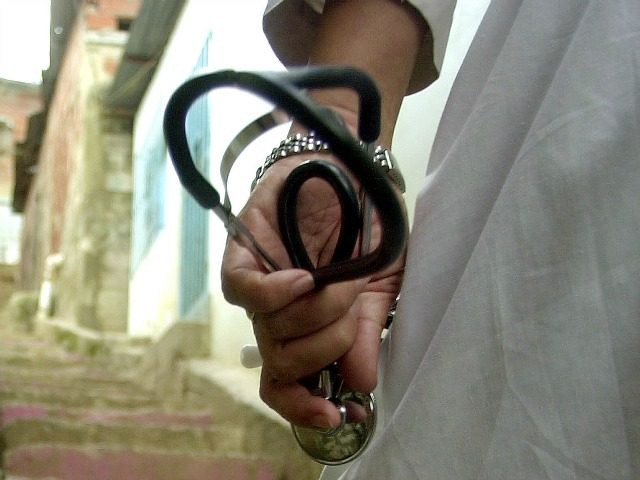The State Department confirmed to the Miami Herald this week that officials are aware of at least 19 cases of American citizens’ complaining of symptoms similar to the hearing loss and “cognitive issues” that U.S. diplomats have suffered after visiting Cuba.
Some reports from American news agencies attributed the symptoms American diplomats suffered while working within the repressive communist state to a “sonic” or “acoustic” attack.
The State Department has referred to the incidents involving diplomats as “attacks” and withdrew all non-essential personnel from its embassy in Havana last year. It also expelled Cuban agents from the embassy in Washington to balance the number of staff in either facility.
“Since September 29, the Department of State has been contacted by 19 U.S. citizens who reported experiencing symptoms similar to those listed in the Travel Warning after visiting Cuba,” a State Department Western Hemisphere Affairs spokesperson told the Herald.
The spokesperson emphasized that the State Department has yet to find “definitive answers” about the symptoms and urged “private U.S. citizens who have traveled to Cuba and are concerned about their symptoms to seek medical attention.”
The State Department has confirmed at least 22 cases of these attacks involving diplomats and confirmed that some of the victims stayed in the Hotels National and Capri, owned by the Cuban government. The Herald notes that the State Department did not confirm whether the civilians that have come forward with health symptoms stayed at these hotels.
The Herald points out that the statement from the department also did not provide any details regarding the symptoms. “We continue to urge U.S. citizens to reconsider travel to Cuba,” the spokesperson added.
Tourism to Cuba by American citizens is technically illegal, but the U.S. government allows privileged citizens to travel to the island through a variety of loopholes in embargo restrictions, including “support for the Cuban people,” “humanitarian projects,” and “educational activities.” Prior to the inauguration of the Trump administration – which did away with a category of travel called “individual people to people exchanges” that required minimal explanation for the travel – celebrities like Beyoncé, Kim Kardashian, Rihanna, and Katy Perry all enjoyed stays at government-run luxury establishments on the impoverished island.
The Trump administration has not taken sweeping measures to limit the inadvertent funding by American citizens of the Cuban military, which owns most tourist facilities on the island, but it has vocally condemned the repressive Castro regime. The Castro regime has blamed President Donald Trump’s awareness campaign about human rights violations on the island for a drop in tourist revenue in 2017.
According to José Manuel Bisbé York, head of state travel conglomerate Viajes Cuba, the number of visitors to Cuba dropped nearly 20 percent in 2017. York also blamed the devastation left by Hurricane Irma – which the Cuban government’s communist system has failed to repair – for the drop.
The Castro regime has responded to the drop by courting American politicians who can set aside moral considerations to visit the island. This week, Cuban Foreign Minister Bruno Rodríguez welcomed Reps. Barbara Lee (D-CA), Karen Bass (D-CA), and Roger Marshall (R-KS) to the island. Earlier in January, Rodríguez welcomed Sen. Jeff Flake (R-AZ), who has long enjoyed a friendly relationship with the Castro regime.
Flake parrotted the Castro regime line that there is no evidence that the attacks on Cuban diplomats occurred at all. The regime has referred to the attacks as “science fiction” and claimed that cricket and cicada noises, not a weapon, caused the brain damage reportedly documented in diplomats.
The State Department previously confirmed that they had begun documenting bizarre incidents involving American officials in Cuba in late 2016. Diplomats and their families reported hearing strange buzzing noises and, subsequently, suffering health symptoms. While the State Department has refused to specify the symptoms, citing patient privacy, various reports in the Associated Press and elsewhere identified some of the symptoms as hearing loss, dizziness, “concussion-like” effects, and brain damage. At the time the reports were released, the Cuban-American news organization Martí reported that the symptoms were similar to damage seen in Iraq and Afghanistan war veterans who had survived loud explosions, suggesting that the Cuban government’s repeated claims that sound could not have such a devastating effect on a human body were unfounded.
Secretary of State Rex Tillerson has referred to the incidents as “attacks” and blamed the Cuban government. President Trump has echoed this belief, saying in October, “It’s a very unusual attack, as you know, but I do believe that Cuba is responsible.”
“What we’ve said to the Cubans is: small island,” Tillerson told reporters in December. “You’ve got a sophisticated security apparatus. You probably know who is doing it. You can stop it. It’s as simple as that.”

COMMENTS
Please let us know if you're having issues with commenting.